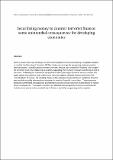Files in this item
Securitising money to counter terrorist finance : some unintended consequences for developing economies
Item metadata
| dc.contributor.author | Vlcek, William | |
| dc.date.accessioned | 2016-01-12T11:10:03Z | |
| dc.date.available | 2016-01-12T11:10:03Z | |
| dc.date.issued | 2015-11-01 | |
| dc.identifier | 74460271 | |
| dc.identifier | ecf65721-b9fb-4115-8391-38308813a463 | |
| dc.identifier | 84946482633 | |
| dc.identifier | 000364342700003 | |
| dc.identifier.citation | Vlcek , W 2015 , ' Securitising money to counter terrorist finance : some unintended consequences for developing economies ' , International Studies Perspectives , vol. 16 , no. 4 , pp. 406 - 422 . https://doi.org/10.1111/insp.12068 | en |
| dc.identifier.issn | 1528-3577 | |
| dc.identifier.other | ORCID: /0000-0001-8647-5258/work/58055322 | |
| dc.identifier.uri | https://hdl.handle.net/10023/8003 | |
| dc.description.abstract | With its roots in the “war on drugs” and the criminalization of money laundering, the global initiative to combat the financing of terrorism (CFT) provides one strategy for preventing and preempting terrorist attacks. In public pronouncements, terrorist finance was named the “lifeblood” and “oxygen” for terrorism itself, thus displaying an analogy suggesting that its mere removal could bring an end to terrorism. Following the theoretical perspective of the Copenhagen School of security studies, this paper argues that national and international measures against terrorist finance constitute the “securitization” of money. By situating money as the essential component to an existential threat, it was possible to justify extraordinary measures to monitor financial transactions. These measures produced unintended consequences prompting resistance and an evolution of procedures to reduce those consequences. This paper considers two affected areas (migrant remittances and financial inclusion) and points to the potential use of financial surveillance against grand corruption. | |
| dc.format.extent | 340082 | |
| dc.language.iso | eng | |
| dc.relation.ispartof | International Studies Perspectives | en |
| dc.subject | Terrorist finance | en |
| dc.subject | Securitisation | en |
| dc.subject | Development | en |
| dc.subject | HV Social pathology. Social and public welfare | en |
| dc.subject | HG Finance | en |
| dc.subject | BDC | en |
| dc.subject | R2C | en |
| dc.subject | SDG 8 - Decent Work and Economic Growth | en |
| dc.subject | SDG 16 - Peace, Justice and Strong Institutions | en |
| dc.subject.lcc | HV | en |
| dc.subject.lcc | HG | en |
| dc.title | Securitising money to counter terrorist finance : some unintended consequences for developing economies | en |
| dc.type | Journal article | en |
| dc.contributor.institution | University of St Andrews. School of International Relations | en |
| dc.contributor.institution | University of St Andrews. Centre for Global Law and Governance | en |
| dc.identifier.doi | 10.1111/insp.12068 | |
| dc.description.status | Peer reviewed | en |
This item appears in the following Collection(s)
Items in the St Andrews Research Repository are protected by copyright, with all rights reserved, unless otherwise indicated.

